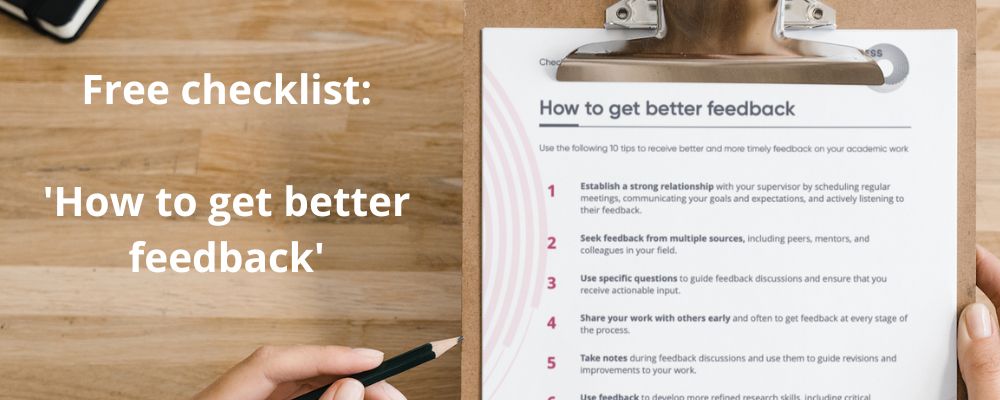Are you struggling to receive timely and constructive feedback on your research work? This common issue can lead to frustration, uncertainty, and a lack of direction. However, there are steps you can take to improve the feedback you receive. In our latest blog post, we offer ten practical tips to help you get the feedback you need to progress in your academic career. From being proactive and seeking out feedback to being specific in your requests and setting clear expectations, these tips will help you navigate the feedback process with more confidence and success.
If you are a young academic, PhD candidate, or early-career researcher, you are no stranger to the frustration of receiving poor and delayed feedback on your work. We have heard about these issues many times from those we have spoken to. Just this week, a PhD candidate reported that he had been waiting for feedback from his supervisor on a paper he was about to submit for several months, with no sign of when he might receive it. Obviously, this is not only frustrating but can also be a significant obstacle to his personal academic progress.
However, feedback is essential for academic growth and success, but obtaining timely and helpful input can be challenging. In fact, a lack of feedback can lead to feelings of isolation and self-doubt about your abilities.
But there are ways to improve the quality and timeliness of the feedback you receive. In this post, we’ll explore ten actionable tips that will help you get better feedback on your academic work.
These tips range from establishing a strong relationship with your supervisor, seeking feedback from multiple sources, and using specific feedback to improve your writing and research skills. With these strategies, you can turn feedback into a tool for growth and success, rather than a source of frustration.
Don’t let poor feedback hold you back from achieving your academic goals. By following the tips outlined in this post, you can build stronger relationships with your colleagues and mentors, develop more refined research skills, and gain the confidence you need to succeed in your academic career.
Let’s dive into the ten tips for getting better feedback on your academic work:
1. Seek feedback from multiple sources
Don’t rely on just one person to provide feedback on your work. Seek feedback from multiple sources, such as peers, colleagues, mentors, and experts in your field. For example, you can form a writing group with other PhD candidates or early-career researchers and exchange feedback on each other’s work. This will ensure that you receive a diverse range of feedback on your work, making you less reliant on a single opinion.
2. Identify the type of feedback you need
Before seeking feedback, be clear on what kind of feedback you require. Is it on the structure of your paper or the content? Do you need help with grammar or need someone to check your data analysis? Don’t ask for vague feedback like “what do you think, is my paper clear enough?” Instead, be specific about what you want feedback on, such as the clarity of your argument, the organization of your paper, or the methodology you used. For example, you can ask your supervisor to provide feedback on the methodology you used in your research and whether it is appropriate for your research question.
3. Be specific in your request
When asking someone for feedback, provide them with clear instructions on what you need them to review. There’s no need for them to spend time commenting on the entire paper if you’re primarily struggling with the method section. Similarly, don’t ask for a proofread of the entire manuscript if you plan to have it edited by a native speaker or professional editing service. This can save time for both parties and ensure you get the feedback you require.
4. Choose your reviewers carefully
Consider who would be the best person to provide feedback on your work. Seek out those with expertise in your field or individuals who have previously published work in similar areas.
You might want or need to include your supervisors in this process, but they don’t have to be the only ones providing feedback on your work. Look for other researchers whom you trust, value, and are willing to take advice from.
5. Ask for feedback early
It’s always better to ask for feedback early on in the writing process. This can help you identify any issues before you become too invested in your work, saving you time and effort in the long run.
Don’t wait until the last minute to ask for feedback on your work. Ask for feedback in a timely manner so that you have enough time to incorporate the feedback into your work. For example, if you have a paper due in three weeks, ask for feedback at least two weeks in advance so that you have enough time to revise your paper.
6. Be open to constructive criticism
Feedback isn’t always easy to hear, but it’s important to be open to constructive criticism. This can help you improve your work and avoid making the same mistakes in the future.
Be open to feedback from people with different perspectives and backgrounds. This can help you to broaden your understanding of the topic and improve your work. For example, if you are researching a topic in psychology, seek feedback from both psychologists and non-psychologists to get a more well-rounded perspective.
Remember that constructive feedback is about your work, not about you as a person. Therefore, no need to take feedback personally or get defensive. Instead, try to see feedback as an opportunity to improve your work. If someone points out a weakness in your argument, don’t take it as a personal attack, but rather see it as an opportunity to strengthen your argument.
7. Actively Listen to Feedback
When receiving feedback, actively listen to the feedback and take notes. Ask clarifying questions if necessary to ensure that you understand the feedback. For example, if someone suggests that your argument is unclear, ask them to provide specific examples of where they found the argument to be unclear.

8. Follow up with your reviewer
Once you’ve implemented the feedback, follow up with your reviewer to show them how their feedback has helped you improve your work. This can also help to build relationships and foster future collaborations.
9. Provide context for your work
Provide context for your work when seeking feedback. Explain what your research question is, what methodology you used, and what your main findings are. This can help the person providing feedback to better understand your work and provide more relevant feedback. For example, when seeking feedback on a research paper, provide an overview of the research question, methodology, and main findings.
10. Use feedback to improve your work
Use the feedback you receive to improve your work. Don’t just ignore feedback or file it away. Instead, incorporate the feedback into your work to make it better. For example, if someone suggests that you add more evidence to support your argument, revise your paper to include more evidence.
Take the time to understand the feedback you received, otherwise, you will hardly improve your work. Ask questions if anything is unclear, and take note of any suggestions for improvement.
Conclusion
Receiving timely and constructive feedback is essential for your academic growth and success. However, feedback needs to be timely and provided in a constructive and helpful manner; otherwise, you may be left disappointed and struggling to improve your work.
By following the ten tips provided above, you can improve the quality of the feedback you receive and use it to refine your paper or other academic work. However, the most important recommendation is to be proactive in seeking feedback. Don’t wait for your supervisor or colleagues to initiate feedback discussions. Instead, take the initiative to ask for feedback and seek out multiple sources of feedback. By doing so, you’ll gain valuable insights into your research work and be better equipped to achieve your academic goals.
We created a free checklist to download titled “How to get better feedback”, which will help you in receiving better feedback.

Related resources
- Checklist “How to get better feedback”
- Smart Academics Blog post 131: How to take effective meeting notes—and why?
- Smart Academics Blog post 119: Why giving feedback to conference presentations–and how
- Smart Academics Blog post 109: Four reasons why a writing buddy can help you!
- SMart Academics Blog post 105: The perfect paper—and how to create yours!
Related courses
More information
Do you want to successfully write and publish a journal paper? If so, please sign up to receive our free guides.
Photograph by Christina Wocintechchat at Unsplash
© 2023 Tress Academic
